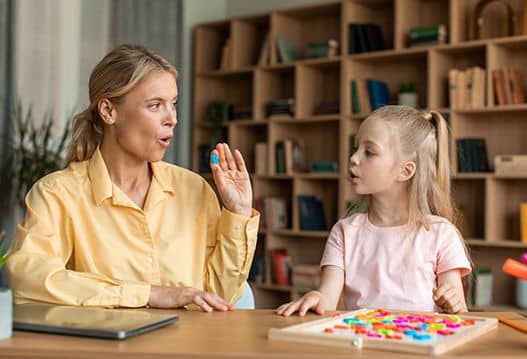
Speech and language Therapy in Karachi
Book An Appointment For Intake Session / Consultancy / OPD charges Rs. 1000/- only
Connect With Us For The Consultancy
"Speech and language therapy empowers individuals to locate their voice, unlocking the doors to effective verbal exchange and fostering a World of possibilities.”
Speech and Language Therapy?
Speech therapy, also called speech-language therapy is a specialized and evidence-based professional provider supplied through certified speech-language pathologists (SLPs) geared toward diagnosing, assessing, and treating communication problems and challenges, which include speech, language, voice, fluency, and swallowing difficulties, with the last goal of improving individuals' ability to talk efficiently and expectantly throughout diverse contexts and enhancing their ordinary best of existence.
Why Speech and Language Therapy is needed?
Speech therapy is needed to deal with and overcome conversation-demanding situations and issues that individuals might also revel in. Those challenges can manifest in various methods, together with difficulty in articulating sounds truly, suffering with language comprehension and expression, experiencing voice issues, or going through problems with fluency during speech. Expert speech therapy gives evidence-based evaluation, personalized therapy plans, and centered interventions to assist individuals increase and refine their communication skills. By using addressing those conversation boundaries, speech therapy empowers individuals to enhance their capacity to explicit themselves efficaciously, interact in significant interactions, take part in social and academic settings, and the end improve their universal first-class of life.

Inspire for Better Living…
Let’s Connect!
Benefits of Speech and Language Therapy
Speech therapy offers several advantages, in particular for children, addressing various conversation problems and fostering their typical improvement. Some key advantages of speech therapy include:
- Stepped-forward communication abilities: Speech therapy allows children to increase clearer articulation, right pronunciation, and fluent speech.
- Better Social Interaction: By addressing communication challenges, speech therapy enhances on child’s potential to interact, fostering friendships and building self-confidence in social settings.
- Educational Fulfillment: Improved speech and language competencies impact a child's educational overall performance, assisting them in studying, writing, and expressing thoughts certainly inside the study room.
- Decreased Frustration: Speech therapy facilitates kids to conquer verbal exchange problems, lowering frustration and selling emotional nicely-being as they can correctly carry their desires and feelings.
- Early Intervention: For children with speech or language delays, early speech and language therapy can save you from further demanding situations and promote verbal exchange improvement.
- Self-Belief: As children make development in speech therapy, they advantage of self-assurance in their capacity to speak, leading to expanded participation in numerous sports and environments.
- Own Family Aid: Speech and language therapy includes collaboration with the mother and father and caregivers, imparting them with strategies to assist their child's conversation development at home, reinforcing progress, and selling constant increase.
- Addressing Swallowing problems: Speech therapists also can address swallowing difficulties, ensuring children can correctly devour food and beverages.
Dealing with Common Speech Issues Using Speech Therapy
- Articulation Disorders: Through articulation therapy, SLPs work with individuals to target specific speech sounds, using exercises and drills to improve their pronunciation and speech clarity.
- Phonological Disorders: SLPs employ phonological therapy to help individuals understand and use the rules of speech sounds, enhancing their language skills and communication.
- Stuttering: With fluency-enhancing techniques and strategies, SLPs assist individuals in reducing stuttering and achieving smoother speech.
- Voice Disorders: SLPs may use vocal exercises, vocal hygiene practices, and vocal cord strengthening techniques to improve voice quality and resonance.
- Language Disorders: SLPs offer language therapy sessions, tailored to address comprehension, expression, grammar, and vocabulary, aiming to enhance overall language proficiency.
- Apraxia of Speech: Through motor speech therapy, SLPs develop personalized plans to improve motor planning and coordination, leading to better speech production.
- Dysarthria: SLPs work on strengthening oral muscles and providing exercises to enhance speech clarity and intelligibility.
- Aphasia: SLPs provide language therapy, incorporating strategies to help individuals with aphasia regain and enhance their language abilities.
- Cluttering: SLPs employ techniques to reduce rapid speech and improve overall communication clarity.
What Are Our Specialties in Speech and Language Therapy?
In the realm of speech and language therapy, our team boasts a rich tapestry of unique specialties and expertise. These core areas of proficiency include:
Articulation and Phonological Disorders
We have extensive experience in identifying and treating speech disorders related to articulation and phonological processes, striving to improve speech clarity and intelligibility.
Language Development and Delay
We deeply understand language development milestones and address language delays in both children and adults, improving the growth of age-appropriate language skills.
Apraxia of Speech
We are well-versed in working with individuals dealing with apraxia of speech, a motor speech disorder that impacts speech planning and execution. Through tailored therapeutic techniques, we aim to enhance speech production and communication abilities.
Stuttering and Fluency Disorders
We offer expertise in assisting individuals facing stuttering and fluency challenges, utilizing evidence-based interventions to promote smoother speech and boost communication confidence.
Voice Disorders
Our team is proficient in diagnosing and treating various voice disorders, such as vocal nodules, vocal cord paralysis, and vocal strain, to achieve healthier and more sustainable vocal production.
Language Processing Disorders
We possess specialized knowledge in addressing language processing difficulties, supporting clients in enhancing comprehension, expression, and overall language processing capabilities.
Social Communication Disorders
We have a deep understanding of supporting individuals facing social communication difficulties, including those within the autism spectrum. We employ effective interventions to facilitate meaningful social interactions and pragmatic language skills.
Aphasia Rehabilitation
We provide personalized and intensive therapy for clients who have experienced aphasia due to stroke or brain injury, aiming to improve language abilities and enable functional communication.
Cognitive-Communication Disorders
Our speech therapists are skilled in assisting individuals with cognitive-communication deficits, developing personalized strategies to enhance communication within the context of cognitive impairments.

Speech and Language Therapy for Intellectual Disability:
Speech and language therapy plays a pivotal position in assisting individuals with intellectual disabilities by using enhancing communication talents, language development and social interactions. Through centered interventions and alternative conversation strategies, speech therapists enhance expressive and receptive language capabilities, foster social communication, and promote cognitive skill improvement. By building confidence and supplying customized support, speech therapy empowers individuals with disabilities to efficaciously explicit themselves and interact extra meaningfully in their everyday lives.
Speech and language Therapy in Karachi
Book An Appointment For Intake Session / Consultancy / OPD charges Rs. 1000/- only
Connect With Us For The Consultancy
Speech and Language Therapy and Attention Deficit Hyperactive Disorder (ADHD):
Speech therapy supports individuals with ADHD using improving conversation abilities, attention, and social interactions. Therapists cope with articulation, language development, and self-regulation, improving usual conversation and self-expression. Through personalized processes, speech and language therapy empower individuals with ADHD to navigate communication-demanding situations, selling extra confidence and improving fine of lifestyles.
Speech and Language Therapy and Autism:
Speech therapy in autism is a specialized intervention geared toward addressing conversation challenges and improving language abilities in individuals on the autism spectrum. Speech therapists work with individuals with autism to enhance their verbal and nonverbal communication, develop pragmatic language talents for social interactions, and foster emotional law. Using tailoring interventions to a person's wishes, speech therapy empowers individuals with autism to talk extra effectively and engage meaningfully in their daily lives.
